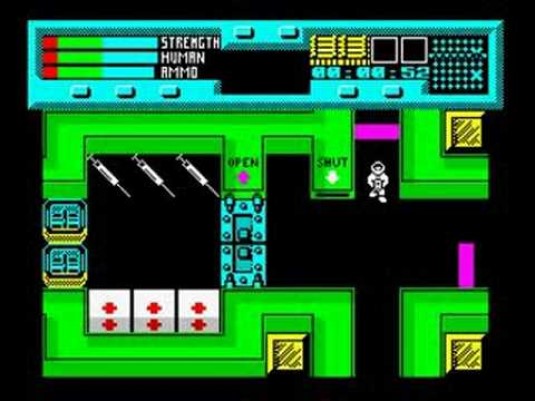
I remember picking this up in a four-pack of science fiction games from Derby Woolies. If memory serves, the other three titles were the equally obscure strategy game, Invasion (never could work this one out), the terrible isometric shooter Galletron, and the far more interesting giant ant killing simulator, Amaurote. Rescue was by far the most immediately playable and accessible of the lot, and it went on to become one of my brother's favourite games.
The plot was perhaps a bit too detailed for a £1.99 game, but it provided background enough for some arcade action. As the Solar System fell apart following the terrible "Last War", humanity retreated to its enclaves scattered across the moons and planets. Yet out at Pluto some UN scientists developed a star drive that ... might double up as a nasty weapon. Cue the attention of space pirates and all manner of other nasties. The player's job, having docked with their space station, is rescuing as many scientists as possible, their experiments, and stock up on enough fuel to take off. Two problems. The enemies are also roaming the station, and a 30 minute destruct system has been activated. Yikes.
The action is a flip screen affair. Wander around the map locating where the scientists are, shepherd them back to the ship, and kill the enemies. This, however, was easier said than done. There were eight of our lab-coated chums in all but they can't simply be collected. At any given time one would wake up and start running around. The tricky job was blocking off exits and bumping into the panicking boffin to try and force them in the direction you want them to go. Get them in your ship and they eventually run into one of the suspended animation pods. Do this and another scientist somewhere wakes up and starts running around. And so off you go to find them. If this wasn't bad enough, each has a red test tube next to them we should also be returned to the ship. One of these scientists and their experiments is the star drive and its inventor, but the only way of knowing for sure you have them is collecting all eight. On top of this, you need to acquire enough fuel to take off. Without it, your ship will crash and the mission ends in failure.
Rescue is very interesting for a couple of reasons. While some would undoubtedly find the herding aspect of the game irritating to the point of hair pulling, you can forget the main mission completely and go about doing your own thing. The scientists can be killed, so there was some satisfaction to be had from hunting and shooting them all yourself. Rooms can also be blocked off preventing the space pirates from entering, and one thing I enjoyed doing was going to the far room in which the screen is separated by a wall and watching a menagerie of baddies move in and kill each other. It was a lesson in how many decent-sized sprites the Speccie could handle on screen (three), and there was something of a kick from teasing the indestructible tanks - a baddy totally impervious to your fire and only offable thanks to detonating one of the bombs lying around. In other words, this was an early example of a sand box game. It was time limited and there wasn't much to the game world, but it allowed the player a much greater degree of freedom within its parameters then most other arcade adventures on the Speccy.
The other interesting aspect was the degrading environment. If the two main entry points for the space pirates aren't blocked off, then the station can be quickly overrun. This is a problem if there are a few tanks about, but also each enemy destroys the environment. Often entering a screen a baddie will be in the process of destroying a door, a crate, a teleportation terminal or, argh, a sleeping scientist! Because enemies are dumb they'll also have a go at setting off a bomb. And when that blows, everything is damaged. Screens blow out, cracks paper the walls. Ammo boxes, first aid kits, crates, all destroyed. Their capacity for destroying the environment adds urgency to the player who wants to complete the game properly. Go after all the scientists, is there going to be enough fuel left? Put a tiger in your tank first and will the pirates have killed a few snoozing savants and wrecked the experiments? Decisions, decisions.
Rescue is a good game, though it only attracted average reviews at the time. No two goes were exactly the same and it offered a limited environment for experimentation and rejection of the aims of the game if the player so chose. Indeed, playing about, exploring, trapping tanks and treating them like pets, if anything its sandboxy character of enables you to learn the game, understand its enemies and mechanics, and how goodie boxes do more than refill the health and recharge the laser. Knowing its ins and outs and doing your own thing prepares the player for the actual mission, spells out the challenge it presents, and makes them want to do it as a test of skill and mastery over the environment. As such Rescue deserves to be remembered precisely because of its innovative, partially open-ended game design. Crank up the Speccy emulator and give it a go. It's not like there's going to be much on television.
No comments:
Post a Comment